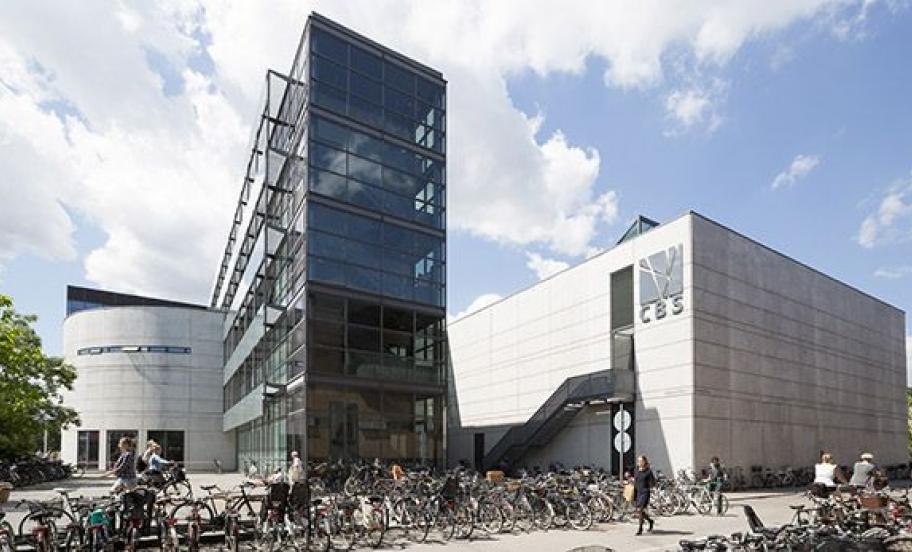MSc in Economics and Business Administration in General Management and Analytics
The MSc EBA GMA programme combines business economics, strategic management, and data-driven analytics to equip you as a student with the skills to make informed decisions, solve complex problems, and create value across organisations.

About MSc in Economics and Business Administration in General Management and Analytics
Why study MSc EBA GMA?
3 good reasons to choose MSc EBA GMA
Shaping strategy and leading across boundaries
Turning data into decisions
Creating innovative solutions with real impact
“I like that the courses we have are a combination of everything, ranging from strategy, analytics courses to finance and accounting. It gives you a broader perspective into different theoretical skills which you can apply to various roles and career paths.” Helen
MSc EBA GMA

Learn to solve complex business challenges
Real business problems are rarely simple. As a manager, you will often face situations where many issues are connected across different parts of an organisation. On this programme, you will learn how to set goals, deal with complexity, and create solutions that add value to both companies and society.
Real- life practice
You will build strong skills in problem-solving and decision-making by combining financial knowledge with analytical tools. Through cases and real-life examples, you will practice using data to design solutions and work with stakeholders across different areas of a business.
Build a solid foundation in management
The programme is based on business economics and gives you a broad foundation for working as a manager. You will learn how to make decisions, understand their financial impact, and see how businesses operate in a wider economic context.
People and data
As a future manager, you will take on roles that involve setting strategy, developing organisations, and ensuring that decisions are carried out. A big part of this is knowing how to bring the right people together and communicate decisions that are not only profitable but also responsible.
“What drew me to GMA was its unique emphasis on applying data, strategy, and finance for well-informed decision-making.” Tore
Student, MSc EBA GMA

Use data and analytics to make better decisions
With the growth of big data, AI, and business intelligence, managers now have powerful tools for making smarter decisions. On this programme, you will learn to use these tools in practice. For example, by modelling customer behaviour, predicting demand, evaluating investments, or assessing business opportunities.
Navigate complexity and make changes
But good management is about more than numbers. You will also learn to combine data with business logic, critical thinking, and collaboration. This means being able to translate complex analyses into decisions that make sense for people and organisations.
To prepare you for this, you will work with both quantitative methods (such as data analysis) and qualitative methods (such as observing and understanding organisational processes). This mix will give you the ability to manage complexity and drive change in real companies.
Master events
See upcoming events that can help you with your study choice and admission.
Structure
Marketing
You learn how to understand markets, customers, and competition through data and analysis. Marketing in General Management and Analytics focuses on developing strategies that connect analytical insight with creativity to create growth and value.
Economics and mathematics
You learn to use economic theory and quantitative methods to make informed managerial decisions. Economics and mathematics in General Management and Analytics provide you with the tools to interpret data, understand performance, and evaluate business opportunities.
Organisation and management
You learn how leadership, collaboration, and structure influence how organisations perform. Organisation and management in General Management and Analytics focus on how to turn analysis into action and ensure alignment between people, strategy, and results.
3 things to consider
Interested in combining analytics and management
Analysing complex situations to develop business insights
Committed to learning and working with others
Programme overview
1st semester
2nd semester
3rd semester
4th semester
More about the programme progression
Studying in English
If you do not have a bachelor’s degree taught in English, we recommend that you read more about what to consider before applying for an English taught programme.
Read more about Teaching and literature in English on Teaching and working methods.
Options during the programme
Electives
On the 3rd semester, you can choose to study courses of your specific interest. CBS offers a large number of electives within a wide range of topics. You can also choose to take electives at other Danish universities. The electives you choose have to be relevant for your programme.
See the current selection of CBS electives on Courses at master level.
Minor
On the 3rd semester, you can also choose to study a so-called minor. A minor is a package of electives within a specific academic area. Typically, it consists of 3 courses. By taking a minor, you strengthen your competences within a specific area of interest, and you can use it to qualify for specific jobs or industries.
See the current selection of CBS minors on Minors.
Exchange
Many students choose to go on exchange on their 3rd semester; usually at one of CBS’ more than 300 partner universities. When you go on exchange through CBS, you do not have to pay for the teaching at the foreign university (with a few exceptions), and you can bring your SU (student grant).
Find a list of all CBS partner universities here.
Internship
You can choose to replace some of your electives with a so-called academic internship. The academic internship consists of an internship period at a company, which is then completed with a project report. You can do the internship at a company in Denmark or abroad.
When doing an internship you get the opportunity to relate theory to practice and reflect on the academic training you receive at CBS in a practical setting. Therefore, the project report and work assignments during your internship have to be relevant to your study programme.
CEMS
On General Management and Analytics, you can apply for the CEMS - Master in International Management programme. CEMS MIM is a double degree programme, which gives you the opportunity to add a second degree in international management to your CBS degree. This means that you will get both the MSc degree and the CEMS in International Management degree.
CEMS is a 1-year programme, which you study in combination with your CBS degree in your 3rd and 4th semester. Part of it takes place at one of the other CEMS universities abroad.
Learn more about CEMS / Master in International Management.
Master's thesis
Your 2nd year is completed with a master's thesis. You choose the topic you want to write about which allows you to focus on a specific topic of your interest. Typically, you write your master's thesis with a fellow student.
“The enthusiasm shows in the classroom, where discussions and feedback are highly encouraged. Furthermore, it is a very large programme, but this has meant lots of opportunities for meeting other students. ” Tore
Student, MSc EBA GMA

Study environment
Academic and social environments
You will be part of an active study environment combining social and academic activities. The programme includes a balance of courses that can be studied more individually and courses where group activities are a vital element. The student association, GMA Society, plays an active role in supporting a good student environment.
Be curious, kind and collaborate
At GMA, we want a stimulating learning environment based on mutual respect through professionalism and kindness. Professionalism means adopting academic curiosity, integrity and striving to develop. Kindness means acknowledging differences and collaborating to achieve mutual development.
Student life at CBS
Studying at CBS is much more than just preparing for and going to classes.
At CBS, there are more than 20,000 students with different backgrounds and nationalities. Teamwork is an essential part of studying at CBS both in classes and in extracurricular activities.
With more than 100 student organisations, you also have plenty of opportunities to engage and connect with students across programmes and classes.
Learn more about the vibrant student life at CBS, the student organisations, and the international environment on Student life.
For internationals
If you are an international student, we have gathered a lot of information about what it is like to be an international student at CBS and how you can prepare for life in Denmark.
Read more on International students.
Meet the students
Student life at CBS
Being a CBS student is about more than going to lectures and doing exams.
Get a glimpse of student life at CBS. Here, you can explore what a typical day of teaching and exams looks like.
Also, you can learn how our programmes are structured and read about social life on campus, including the many ways to connect with fellow students.

Teaching and Exams
Teaching
Teaching combines lectures, exercises and project work, with some courses using blended learning. The balance between individual tasks and group work varies.
Most courses have individual exams, but group activities are part of the learning process. Some focus on individual study (for example Corporate Finance), others combine group projects with individual exams (for example Strategy and Organization) or use group assignments (for example Market Informed Decisions and Business Project).
Read more about Teaching and working methods on Student life
Exams
All courses on the programme include a final exam and the programme includes a variety of examination formats, such as written sit in exams, oral exams and home assignments. To facilitate learning, feedback is included in all courses. Some courses include a mandatory feedback assignment required to participate in the exam.
Read more about Exams and Exam forms on Student life.
Time consumption
Workload
You should know that it is demanding to study in a graduate programme, and both the curriculum and workload is significantly higher than at bachelor level.
If you are studying on a full-time graduate programme, you should expect spending approximately 37 hours on average on your studies each week. The workload will vary during the year.
Hectic around exams
The time leading up to assignment submissions and exams can be hectic, and you can easily work more than 40 hours a week in this period. Preparing for oral exams can be especially time consuming, because you have to be able to explain and discuss the covered concepts and theories and learn things by heart.
Read more on Teaching and working methods
Student job
Most programmes are quite flexible in terms of combining studies with a student job. Most students work a maximum of 15 hours a week in order to have sufficient time for their studies.
Studying in Denmark - for internationals
If this is your first time studying in Denmark, you may find teaching and exam formats, the grading scale and the academic calendar very different from what you are used to.
Read about everything you need to know as an international student studying at CBS on International students
In need of special support?
Do you have a disability such as dyslexia, anxiety, autism, ADHD, long-term effects of concussion or another physical, psychological or neurological disability?
Then you have the opportunity to apply for Special Educational Support (SPS) and special conditions while studying.
This ensures you can study on equal terms with your fellow students.

Teaching and exams
Teaching
Teaching combines lectures, exercises and project work, with some courses using blended learning. The balance between individual tasks and group work varies.
Most courses have individual exams, but group activities are part of the learning process. Some focus on individual study (for example Corporate Finance), others combine group projects with individual exams (for example Strategy and Organization) or use group assignments (for example Market Informed Decisions and Business Project).
Read more about Teaching and working methods.
Exams
All courses on the programme include a final exam and the programme includes a variety of examination formats, such as written sit in exams, oral exams and home assignments. To facilitate learning, feedback is included in all courses. Some courses include a mandatory feedback assignment required to participate in the exam.
Read more about Exams.
Entry requirements
Entry requirements
You are qualified for admission to the study programme if you fulfil the following requirements.
Please note that fulfilling the requirements does not guarantee you a study place.
1. Bachelor degree
2. Language requirement
3. Academic requirements
1. Bachelor degree
Bachelor degree
You must hold a bachelor degree to fulfil the general requirement for admission to CBS’ master programmes. You must have completed your bachelor degree before study start.
Legal claim
MSc in Economics and Business Administration in General Management and Analytics is the natural progression for
- BSc in Business Administration and Service Management from CBS
- BSc in International Business from CBS
- BSc in International Shipping and Trade from CBS
- HA Almen from CBS
- HA EB from CBS
- HA PRO from CBS
- HA(fil.) from CBS
If you hold one of the above-mentioned bachelor degrees, you automatically fulfil all the entry requirements and you may also have legal claim guaranteeing admission. Read more about legal claim.
If you do not have one of the above-mentioned bachelor degrees, you can still be qualified for the programme, if you have an equivalent academic background and if you fulfil the entry requirements.
Have you not yet completed your bachelor degree?
You can apply for admission even if you have not yet completed your bachelor’s degree. However, you must finish it before study start. If you are offered a place, you will be conditionally admitted, which means:
- You must complete your bachelor’s degree before you can begin your studies at CBS.
- You must upload your bachelor diploma and transcript no later than 31 August.
If you do not have a bachelor degree
If you do not hold a bachelor’s degree or another relevant qualification at bachelor level, you must apply for an exemption. Read more about how to apply under Exemptions.
2. Language requirement
English B with minimum grade level 6.0 (Panel content)
The language requirement
The language requirement is English at Danish level B, which must be passed with a minimum grade point average of 6.0 on the Danish grading scale.
Documentation deadline
You must fulfil and document the language requirement before the application deadline.
Check if you fulfil the language requirement
In the tabs above, you can see how to document English level B from a Danish upper secondary exam.
If you do not hold a qualifying Danish upper secondary exam, you can see other ways of meeting the requirement.
We only accept the qualifications and documents listed on this page.
Danish upper secondary exam (Panel content)
Required courses and levels
Danish upper secondary exam or
If you have passed English level B from an upper secondary school in Denmark (ie. stx, hhx, htx, hf) you fulfil this requirement.
English level B must be passed with a minimum grade point average of 6.0.
If you have passed English level A, then you also fulfil the English level B requirement.
Supplementary upper secondary courses
English B as a single subject via secondary school supplementation (Gymnasialt suppleringskursus (GSK)) or as a Higher Preparation Examination single subject (HF-enkeltfag).
English level B must be passed with a minimum grade point average of 6.0.
Individual competency assessment (IKV)
If you think you have language competences corresponding to an English level A, you have the possibility to request an assessment - Individuel Kompetencevurdering (IKV) from a Danish VUC (adult education centre).
Required documentation
Danish upper secondary exam or supplementary upper secondary courses
Upper secondary (ie. stx, hhx, htx, hf) certificate:
- a scan/photo of the original, stamped and signed hard copy or
- a digitally signed certificate downloaded from Min Kompetencemappe
Individual competency assessment (IKV)
Official IKV assessment
Other upper secondary exams (Panel content)
Find your country
International Baccalaureate (IB)
Required qualifications
- English A1, higher level - passed
- English A2, higher level - passed
- English B, higher level - passed
- English A1, standard level - passed
- English A2, standard level - passed
- English A Language and Literature, higher level - passed
- English A Language and Literature, standard level - passed
- English A Literature, higher level - passed
- English A Literature, standard level - passed
- English B, standard level - Minimum grade: 5 (equivalent to 6.0 on the Danish grading scale)
Required documentation
Official IB diploma and/or transcript.
Alternatively, you can give CBS access to your results via IBO.org.
European Baccalaureate (EB)
Required qualifications
- L I
- L II
- L III – 6 years
- L III – 4 years
- L IV – 4 years (4 hours)
Grade requirement
Equivalent to 6.0 on the Danish grading scale:
- 2020 and before: minimum 7.50
- From 2021: minimum 7.79
Required documentation
Official EB diploma and/or transcript
Austria
Required qualifications
English as a first foreign language, min. 9 weekly hours accumulated during the final three years of the Oberstufe.
Grade requirement
Equivalent to 6.0 on the Danish grading scale:
- Minimum grade: 3
Required documentation
Reife- und Diplomprüfung diploma certificate including Stundentafel covering (min.) 5 years of the Oberstufe.
Reifeprüfung diploma certificate including Stundentafel covering (min.) 4 years of the Oberstufe.
Australia
Required courses and levels
A complete upper secondary education from Australia, where the majority of the education has been taught in English, fulfils the English B language requirement.
Required documentation
Senior Secondary Certificate of Education (SSCE) as well as Statement of Result or Record of Achievement or Qualifications Certificate, covering subjects and grades during the last two years of the secondary education.
Belgium (French part)
Required qualifications
- English Langue moderne 1
- English Langue moderne 2
Grade requirement
Equivalent to 6.0 on the Danish grading scale:
- Minimum grade: 65
Required documentation
Certificat d’enseignement Secondaire Supérieur (C.E.S.S.): Section générale OR technique OR artistique AND
Grade transcript including the grades and hours for the final 3 years
Bulgaria
Required qualifications
- English as first foreign language (556 hours)
Grade requirement
Equivalent to 6.0 on the Danish grading scale:
- Minimum grade: 3.5
Required documentation
- Diploma za (Zavarsheno) Sredno Obrazovanie / za Sredno Obrazovanie and
- Grade transcript for Years 10, 11 and 12
Canada
Required courses and levels
A complete upper secondary education from Canada, where the majority of the education has been taught in English, fulfils the English B language requirement.
Required documentation
High School Diploma / Graduation Diploma (or equivalent for your province) as well as Transcript of grades / High School Results (or equivalent for your province)
Croatia
Required qualifications
Minimum total sum of 9 weekly lessons* over years 10, 11 and 12 in Foreign Language 1
* We look at the number of lessons, not the number of hours.
Grade requirement
Equivalent to 6.0 on the Danish grading scale:
- Minimum grade: 3
Required documentation
- Svjedodžba o Državnoj Maturi and
- Final 4 years of exam results
Czech Republic
Required qualifications
Minimum 3 lessons per week in the final three years of the Maturita (equivalent to level B2 in the first foreign language according to Eurydice)
Grade requirement
Equivalent to 6.0 on the Danish grading scale:
- Minimum grade: 3
Required documentation
- Vysvedcení o Maturitni zkoušce and
- Exam results for all years of the Vysvedcení o Maturitni zkoušce and
- School document showing the number of lessons per week for the final three years
England, Wales, Northern Ireland
Required qualifications
- A complete upper secondary education taught in England, Wales or Northern Ireland or
- A level English Language or
- A level English Literature
Required documentation
- GCSE certificate(s) (with a min. of 6 subjects) as well as A-level (Advanced level) certificate(s) (with a min. of 3 subjects) both taken in the UK or
- Official A level certificate for either English Language or English Literature
Estonia
Required qualifications
Min. 8 "kursuste arv" in English
Grade requirement
Equivalent to 6.0 on the Danish grading scale:
- 5 (Loputunnistus)
- 66 (Riigieksamenitunnistus)
Required documentation
- Gümnaasiumi Lõputunnistus and
- Hinnetekeht and
- Riigieksamenitunnistus
Finland
Required qualifications
- Minimum 8 English courses
Grade requirement
Equivalent to 6.0 on the Danish grading scale:
- Minimum grade: 7
Required documentation
- Official certificate - Ylioppilastutkintotodistus / Studentexamensbetyg) and
- Official transcript - Lukion päästötodistus/Avgångsbetyg från gymnasiet
France
Required qualifications
- English Langue vivante A
- English Langue vivante B
- English Langue vivante I
- English Langue vivante II
Grade requirement
Equivalent to 6.0 on the Danish grading scale:
- Minimum grade: 13
Required documentation
- Baccalauréat general diploma and
- Relevé des notes
Germany
Required qualifications
- Regardless of federal state: English studied in each of the four half-years of the Qualifikationsphase, passed with an average of 9 points (punkte) or higher in total
- For Waldorfschule/Rudolf Steiner Schule: English passed (9 points (punkte) or higher) as a Prüfungsfach in the Abiturprüfung
Grade requirement
Equivalent to 6.0 on the Danish grading scale:
- Minimum grade: 8 Punkte
Required documentation
- Exam certificate Abiturzeugnis and
- Exam results for exams (finals) and half-year results for the final 2 years
Hungary
Required qualifications
English as a first foreign language
Grade requirement
Equivalent to 6.0 on the Danish grading scale:
- Minimum grade: 3
Required documentation
- Gimnaziumi erettsegi bizonyitvany and
- Gimnaziumi bizonyitvany
Iceland
Required qualifications
For upper secondary studies completed according to the 2008 reform:
Minimum 15 Fein (new credits) obtained in English; of these, minimum 10 Fein must be at Þrep (qualification level) 3 or higher
For upper secondary studies completed according to the 1999 reform:
Minimum 15 einingar (old credits) obtained in English; at least one English subject must be at level 5 or higher (ENS 103+203+303+403+503)
Grade requirement
Equivalent to 2.0 on the Danish grading scale:
- Minimum grade: 7 (modulebase)
Required documentation
- Stúdentspróf (the diploma must include all course codes)
- Remember to upload your Icelandic diploma, not only the English version.
Ireland
Required qualifications
A complete upper secondary education from Ireland, where the majority of the education has been taught in English.
Grade requirement
Equivalent to 6.0 on the Danish grading scale:
4 (Ordinary Level)
3 (Higher Level)
C2
Required documentation
The Established Leaving Certificate Examination (Leaving Cert) with a min. of 6 subjects total
Italy
Required qualifications
- Classico: English as the obligatory first foreign language
- Scientifico: English as the obligatory first foreign language
- Linguistico: English as the obligatory first, second or third foreign language
- Artistico: English as the obligatory first foreign language
- Scienze umane: English as the obligatory first or second foreign language
- Musicale e coreutico: English as the obligatory first foreign language
Grade requirement
Equivalent to 6.0 on the Danish grading scale:
- 8 (0-10 scale)
- 45 (0-60 scale)
- 72 (0-100 scale)
Required documentation
- Diploma di Esame di Liceo (Classico/Scientifico/Linguistico/Artistico/Scienza Umane/Musicale e Coreutico) and
- Scrutinio di quinta superior
Latvia
Required qualifications
The obligatory course in English (first foreign language) fulfils the requirement
Grade requirement
Equivalent to 6.0 on the Danish grading scale:
- Minimum grade: 6
Required documentation
- Atestâts par vispârējo vidējo izglîtîbu and
- Pielikums atestâtam par vispârējo vidējo izglîtîbu and
- Vispârêjâs vidējâs izglîtîbas sertifikâts
- Izglîtîbas satura un eksaminâcijas centra sertifikâts (only if there is a State exam in one or more subjects)
Lithuania
Required qualifications
- English (1. foreign language) as bendrasis kursas (basic level)
- English (1. & 2. foreign language) as isplestinis kursas (high level)
Grade requirement
Equivalent to 6.0 on the Danish grading scale:
- Minimum grade: 6
Required documentation
- Brandos Atestatas and
- Brandos Atestatas Priedas
Luxembourg
Required qualifications
- A minimum of 210 full teaching hours (of 60 minutes per hour) with an exam passed at upper secondary school level
Grade requirement
Equivalent to 6.0 on the Danish grading scale:
- Minimum grade: 41
Required documentation
- Diplôme and
- Certificat de notes
Malta
Required qualifications
- I level English
Grade requirement
Equivalent to 6.0 on the Danish grading scale:
- Minimum grade: D
Required documentation
- Matriculation Certificate and Advanced Level Certificate and Intermediate Level Certificate
The Netherlands
Required qualifications
- The obligatory course in English fulfils the requirement
Grade requirement
Equivalent to 6.0 on the Danish grading scale:
- Minimum grade: 8
Required documentation
- Voorbereidend Wetenschappelijk Onderwijs Diploma and
- Cijferlist
Norway
Required qualifications
- Engelsk VG English 1 (SPR3029 & SPR3030)
or - Engelsk VG2 International English (SPR3008 & SPR3009)
Grade requirement
Equivalent to 6.0 on the Danish grading scale:
- Minimum grade: 4 (average of all courses)
Required documentation
- Official (digitally signed) transcript for the Vitnemål for videregående opplæring
New Zealand
Required qualifications
A complete upper secondary education from New Zealand, where the majority of the education has been taught in English, fulfils the English B language requirement.
Required documentation
National Certificate of Education Achievement (NCEA) levels 1 and 2 and 3
Portugal
Required qualifications
- Cursos gerais do ensino secundário - Humanidades: 1. Foreign Language in English
- Cursos científico-humanísticos: The obligatory 1. Foreign Language in English or English as Opçoes C og D
Grade requirement
Equivalent to 6.0 on the Danish grading scale:
- Minimum grade: 15
Required documentation
- Exam certificate and
- Documentation from school confirming the level of your subjects/your total number of classes within the specific entry requirements
Romania
Required qualifications
- Theoretical line: Humanities; Specialisation: Filologie English fulfils the entry requirement
- Theoretical line: Humanities; Social Studies English fulfils the entry requirement
Grade requirement
Equivalent to 6.0 on the Danish grading scale:
Minimum grade: 6.4
Required documentation
- Diploma de bacalaureat and
- Foaie matricola
Scotland
Required qualifications
A complete upper secondary education from Scotland, where the majority of the education has been taught in English, fulfils the English A language requirement.
Required documentation
Scottish Qualification Certificate as well as Summary of Attainment, Detail Record of Attainment and Profiles
Singapore
Required qualifications
A complete upper secondary education from Singapore, where the majority of the education has been taught in English, fulfils the English B language requirement.
Required documentation
Singapore-Cambridge GCE A-level exam certificate with a min. of 4 (H1, H2 and H3) exams total, as well as General Paper and Project Work
Slovakia
Required qualifications
- 1. Foreign Language in English with a minimum of 210 taught hours
Grade requirement
Equivalent to 6.0 on the Danish grading scale:
- Minimum grade: 3
Required documentation
- School-Leaving Exam Certificate – Vysvedcenie o maturitnej skúske and
- Supplement to Certificate of School-Leaving Examination and
- Grade transcripts for years 10, 11 and 12
Slovenia
Required qualifications
- The obligatory course in English as first foreign language fulfils the requirement if passed during the 2nd, 3rd and 4th year.
Grade requirement
Equivalent to 6.0 on the Danish grading scale:
- Minimum grade: 3
Required documentation
- Spricevalo o splosni maturi / Maturitetno sprièevalo and
- Obvestilo o uspehu pri splosnui mature and
- Letno spricevalo for the 4th year
South Africa
Required qualifications
A complete upper secondary education from South Africa, where the majority of the education has been taught in English, fulfils the English B language requirement.
Required documentation
National Senior Certificate (Matric/Matriculation Certificate) as well as grade transcript covering subjects and grades during all three years of studies
Spain
Required qualifications
- English as the obligatory first foreign language
Grade requirement
Equivalent to 6.0 on the Danish grading scale:
- Minimum grade: 7
Required documentation
- Título de Bachiller / Bachillerato exam certificate
Sweden
Required qualifications
- Before 2014: Engelska min. Kurs C
- After 2014: Engelska steg 7 (ENGENG07)
Grade requirement
Equivalent to 6.0 on the Danish grading scale:
- Minimum grade: C (A to F scale) 15 / VG (Prior to the latest reform)
Required documentation
- Official transcript for Gymnasieexamen från ett högskoleförberedande program or Slutbetyg från Gymnasieskolan
United States
Required qualifications
A complete upper secondary education from the United States, where the majority of the education has been taught in English, fulfils the English B language requirement.
Required documentation
High School Diploma as well as High School Grade transcript (covering all four years’ worth of subjects and grades) taken in the US.
Language tests (Panel content)
TOEFL
TOEFL iBT/iBT Home Edition
The TOEFL iBT/ iBT Home Edition taken on or after 21 January 2026 must be passed with both
- a minimum overall score of at least 5 and
- a minimum score of 4,5 in each of the four different sections
Exceptionally, we accept an overall score of 94 (old scale) and 4,5 (new scale) in 2026. Both of these results must be present on the certificate. The subscores must still be a minimum of 4,5 in each of the four sections.
The TOEFL iBT/ iBT Home Edition taken before 21 January 2026 must be passed with both
- a minimum overall score of at least 94 and
- a minimum score of 20 in each of the four different sections
MyBest scores are not accepted.
Read more about the TOEFL and how to register on ETS.org.
Documentation
Your TOEFL scores will be verified in the TOEFL database. You must list Copenhagen Business School as one of your score recipients when you sign up for the TOEFL test, or order a score sheet for Copenhagen Business School if you have already taken the test.
The TOEFL institution code for CBS is 7035.
You must upload either your digital copy, or a scan of your hard copy, TOEFL score sheet to the Application Portal.
Have you already passed a test?
Remember to check that your test date is no older than two years by the application deadline.
Be aware that it is your test date and not the date your test results were issued. If your test date is more than two years old by the application deadline, your test will not be accepted.
IELTS
IELTS Academic test
An IELTS academic test result of at least 7.0 with minimum 6.0 in each discipline is required.
IELTS tests that are more than two years old by the application deadline are not accepted
IELTS Online is accepted.
IELTS One Skill Retake scores are not accepted.
Read more about IELTS and how to register
Required documentation
Your IELTS results will be verified in the IELTS database. Please instruct your test centre to make your results available to Copenhagen Business School, either when you book your IELTS test or after the test date.
You must also upload a scan of your IELTS test report form to the Application Portal.
If you have not received the physical test report form, you can upload a document with the "Test Report Form Number" (TRF Number) so we can verify your scores.
Have you already passed a test?
Remember to check that your test date is no older than two years by the application deadline.
Be aware that it is your test date and not the date your test results were issued. If your test date is more than two years old by the application deadline, your test will not be accepted.
Cambridge
Cambridge exam
The following Cambridge exams/certificates fulfil language requirement.
- Cambridge C2 Proficiency (Certificate of Proficiency in English) passed with minimum C and an overall score of minimum 200.
Read more about the CPE and how to register.
- Cambridge C1 Advanced (Certificate of Advanced English) passed with minimum C and an overall score of minimum 185.
Read more about the CAE and how to register.
Documentation
In order for us to verify your results, you need to do the following:
- Sign up and share your results with Copenhagen Business School via the Candidate Results Website. Your Cambridge results are only valid if we can check them on their website.
- Upload your Cambridge C2 Proficiency (CPE) or Cambridge C1 Advanced (CAE) Statement of Results and/or Certificate in the application portal
The Certificate of Proficiency in English and Certificate of Advanced English have no expiration date and are valid for life.
CBS bachelor degree (Panel content)
English-taught bachelor degree from CBS
Applicants with an English-taught bachelor degree from CBS who continue their studies in English at master level have already had their qualifications checked and do not need to upload additional documents.
Danish-taught bachelor degree from CBS
If you have a Danish-taught bachelor degree from CBS, you must document that you fulfil English B with minimum grade level 6.0. If you have legal claim, you do not need to upload documentation for the language requirement.
3. Academic requirements
Academic requirements
You must fulfil the academic requirements before study start.
The academic requirements are a total of 90 ECTS-points comprising of:
45 ECTS-points in the following core academic areas, with a minimum of 5 ECTS-points within each:
- Microeconomics
- Organisation
- Marketing
- Quantitative Methods/Statistics
- Accounting
- Finance
and
45 ECTS-points in Business Administration and/or Economics
Examples of topics that fulfil the academic requirements
Examples
Organisation: Organisational Design, Organisational Structure, Organisational Behaviour, Human Resource Management, Personnel Management, and the like.
NB! Topics within Industrial Organisation are not included in this area
Microeconomics: Utility, Demand, Supply & Equilibrium, Measurement of Elasticities, Consumer Demand Theory, Market Structures and Market Failure.
NB! Topics within Macroeconomics are not included in this area.
Marketing: Marketing Theory, Marketing Management, Branding, Brand Management, and the like.
Quantitative Methods/Statistics: Statistics, Econometrics, Quantitative Methods, and the like.
Accounting: Financial Accounting, Management Accounting, Auditing, Tax Accounting, Controlling, Bookkeeping, and the like.
Finance: Corporate Finance, Investment Analysis, Portfolio Theory and Management, Asset Pricing, Capital Budgeting, Derivatives, Financial Risk Management
NB! Topics within International Economics, Financial Economics and Macroeconomics are not included in this area.
Business Administration: Organisation, Marketing, Quantitative Methods/Statistics, Accounting, Finance, as well as Strategy, Innovation, Supply Chain Management, General Management, and the like.
Economics: Microeconomics, Managerial Economics, Industrial Economics, Macroeconomics, International Economics, and the like.
Check if you fulfil the academic requirements
Advance assessment (Panel content)
Check the advance assessments
CBS Admissions cannot make a pre-assessment of your individual qualifications before you apply for admission.
Find your bachelor programme
Instead, we have assessed a number of bachelor programmes. In these so-called advance assessments, you can see whether your bachelor degree fulfils the academic entry requirements.
An advance assessment shows whether the obligatory courses in your bachelor programme fulfil the academic requirements for a master programme at CBS.
We typically prepare an advance assessment when many applicants from the same bachelor programme apply for the same master programme.
You can find them by clicking on the tabs above.
Missing courses?
If you are missing courses, you may be able to fulfil the requirements through relevant elective courses or supplementary courses.
See what to do if you are missing courses to fulfil the adacemic requirements
No advance assessment?
If your bachelor programme is not listed under the tabs above, you can make your own assessment of to what extent you meet the entry requirements through the courses you have taken in your bachelor programme and any supplementary courses.
Use the form below.
CBS (Panel content)
Qualifying bachelor degrees
If you have on of the following bachelor degrees you fulfil the academic requirements for 2026:
BSc in Business Administration and Service Management
Enrolled all years
BSc in International Business
Enrolled all years
BSc in International Business – Globe 2.0 /TREBLE
Enrolled in 2023
BSc in International Shipping and Trade
Enrolled all years
BSc in International Shipping and Trade – Global Supply Chain and Logistics Management (SCLM)
Enrolled in 2023
HA almen erhvervsøkonomi
Enrolled all years
HA i europæisk business (HA EB)
Enrolled all years
HA i projektledelse
Enrolled all years
HD 2.del
Enrolled all years
HA(jur.) - erhvervsøkonomi og erhvervsjura
Enrolled in 2022 or 2023
HA(mat.)
Enrolled in 2023
For enrolment in 2022, find the Advance assessment under 'Potentially qualifying Bachelor Degrees'.
BSc in Business Administration and Digital Management
Enrolled in 2022 or 2023
BSc in Business Administration and Sociology
Enrolled in 2022 or 2023
BSc in International Business in Asia (IBA)
Enrolled in 2021 or 2022
HA(psyk.) - erhvervsøkonomi og psykologi
Enrolled in 2022 or 2023
HA(fil.) - erhvervsøkonomi og filosofi
Enrolled in 2022 or 2023
Potentially qualifying bachelor degrees
Check to see which academic areas you are missing in order to fulfil the academic requirements in 2026:
BSc in Business, Language and Culture
Enrolled in 2022 or 2023
- 5 ECTS-points in Marketing
BSc in International Business and Politics
Enrolled in 2022 or 2023
- 5 ECTS-points in Marketing
HA(it.) - erhvervsøkonomi og informationsteknologi
Enrolled in 2022 or 2023
- 5 ECTS-points in Quantitative Methods/Statistics
- 5 ECTS-points in Marketing
HA(kom.) - erhvervsøkonomi og virksomhedskommunikation
Enrolled in 2022 or 2023
- 5 ECTS-points in Accounting
HA(mat.) - erhvervsøkonomi og matematik
Enrolled in 2022
- 5 ECTS-points in Accounting
HA i markeds- og kulturanalyse (MAK)
Enrolled in 2022 or 2023
- 5 ECTS-points in Organisation
- 5 ECTS-points in Finance
Denmark (Panel content)
Qualifying bachelor degrees
If you have on of the following bachelor degrees you fulfil the academic requirements for 2026:
AU - BSc in Economics and Business Administration
Including applicants enrolled in a credit programme under BSc in Economics and Business Administration
Enrolled in 2022 or 2023
AU - HA erhvervsøkonomi
(regardless of specialisation)
Including applicants enrolled in a credit programme under HA
Enrolled in 2022 or 2023
AU - HA(jur.)
Enrolled in 2022 or 2023
AAU - BSc in Economics and Business Administration
includes applicants enrolled in a credit programme under BSc in Economics and Business Administration
Enrolled in 2022 or 2023
AAU - HA erhvervsøkonomi
Includes applicants enrolled in a credit programme under HA
Enrolled in 2022 or 2023
SDU - BSc in Economics and Business Administration
Regardless of specialisation
Including applicants enrolled in a credit programme under BSc in Economics and Business Administration
Enrolled in 2022 or 2023
SDU - HA erhvervsøkonomi
Regardless of specialisation
Including applicants enrolled in a credit programme under HA
Enrolled in 2022 or 2023
SDU - BSc in International Business Administration and Foreign Languages/BSc i international erhvervsøkonomi med fremmedsprog
Enrolled in 2022 or 2023
RUC - BSc in Business Administration from RUC
Including applicants enrolled in a credit programme under BSc in Business Administration
Enrolled in 2022 or 2023
RUC - Samfundsvidenskabelig bachelor + Erhvervsøkonomi (HA) single subject
Including applicants enrolled in a credit programme under HA
Enrolled in 2022 or 2023
RUC - International Bachelor in Social Sciences + Business Administration (single subject)
Including applicants enrolled in a credit programme under Business Administration
Enrolled in 2022 or 2023
HD 2.del (regardless of institution)
Regardless of your year of enrolment
Potentially qualifying bachelor degrees
Check to see which academic areas you are missing in order to fulfil the academic entry requirements in 2026:
SDU - BA i erhvervsøkonomi - erhvervssprog, negot., with English or German
Enrolled in 2022 or 2023
- 5 ECTS-points in Accounting
- 5 ECTS-points in Finance
- An additional 5 ECTS-points in one or more of the following areas: Microeconomics, Organisation, Marketing, Statistics/Quantitative Methods, Accounting, Finance
SDU BSc in Market and Management Anthropology
Enrolled in 2022 or 2023
- An additional 15 ECTS-points in one or more of the following areas: Microeconomics, Organisation, Marketing, Statistics/Quantitative Methods, Accounting, Finance
Non-qualifying bachelor degrees
Your obligatory courses do not fulfil the academic requirements and it is unlikely that elective courses and/or taking supplementary courses will help you to fulfil the requirements in full.
Professional bachelor degree in International Sales & Marketing (top-up) (regardless of institution)
Applicants enrolled in 2022 or 2023 do not fulfil the following academic requirements:
- 5 ECTS-points in Microeconomics
- 5 ECTS-points in Organisation
- 5 ECTS-points in Marketing
- 5 ECTS-points in Quantitative Methods/Statistics
- 5 ECTS-points in Accounting
- 5 ECTS-points in Finance
- An additional 15 ECTS-points in one or more of the above areas
Applicants enrolled in 2024 do not fulfil the following academic requirements:
- 5 ECTS-points in Microeconomics
- 5 ECTS-points in Organisation
- 5 ECTS-points in Marketing
- 5 ECTS-points in Quantitative Methods/Statistics
- 5 ECTS-points in Accounting
- 5 ECTS-points in Finance
- An additional 20 ECTS-points in one or more of the above areas
Professional bachelor in Leisure Management (regardless of institution)
Applicants enrolled in 2022 or 2023 do not fulfil the following academic requirements:
5 ECTS-points in Microeconomics
5 ECTS-points in Organisation
5 ECTS-points in Marketing
5 ECTS-points in Quantitative Methods/Statistics
5 ECTS-points in Accounting
5 ECTS-points in Finance
An additional 15 ECTS-points in one or more of the above areas
Professionsbachelor i Finans (regardless of institution)
Applicants enrolled in 2022 or 2023 do not fulfil the following academic requirements:
- 5 ECTS-points in Microeconomics
- 5 ECTS-points in Organisation
- 5 ECTS-points in Marketing
- 5 ECTS-points in Quantitative Methods/Statistics
- 5 ECTS-points in Accounting
- 5 ECTS-points in Finance
- An additional 15 ECTS-points in one or more of the above areas
The following electives may be used to cover the above:
- "Finansielle forretninger og rådgivning A+B" fulfil 5 ECTS-points in Finance
- "Økonomistyring A (Ekstern Regnskab) + Økonomistyring B (Strategisk Økonomistyring)" fulfil 5 ECTS-points Accounting
Austria (Panel content)
Qualifying bachelor degrees
We have not made standard assessment for a bachelor degree from Austria, that directly qualify for a master programme.
Potentially qualifying bachelor degrees
Check to see which academic areas you are missing in order to fulfil the academic entry requirements in 2026:
Bachelor in Business and Economics (BBE) - Vienna University of Economics and Business (WU)
Enrolled in 2022 or 2023
- 5 ECTS-points in Marketing
- 5 ECTS-points in Finance
All obligatory courses have been taken into consideration. Electives, free electives, courses included in specialisations or courses completed as part of double degree programme with QUT have not been included - please provide official course descriptions (taken from eVVZ or issued by QUT) when you apply.
Germany (Panel content)
Qualifying bachelor degrees
If you have the following bachelor degree you fulfil the academic entry requirements for 2026:
University of Mannheim - Bachelor of Business Administration/ Betriebswirtschaftslehre
Enrolled in 2022 or 2023
Potentially qualifying bachelor degrees
Check to see which academic areas you are missing in order to fulfil the academic requirements in 2026:
Ludwig-Maximilian University of Munich (LMU) - BA in Business Administration/ Betriebswirtschaftslehre
Applicants enrolled in 2022 or 2023 do not fulfil the following academic requirements:
- 1.5 ECTS-points in Marketing
Ludwig-Maximilian University of Munich (LMU) - BA in Economics/ Wirtschaftswissenschaft
Enrolled in 2022 or 2023
- 5 ECTS-points in Organisation
- 5 ECTS-points in Marketing
- 5 ECTS-points in Accounting
- 5 ECTS-points in Finance
Please document relevant electives with official course descriptions.
University of Münster (WWU) - BA in Business Administration/ Betriebswirtschaftslehre
Applicants enrolled in 2022 or 2023 do not fulfil the following academic requirements:
- 1.5 ECTS-points in Organisation
If you received transfer credit for one or more obligatory courses (or if you switched PO), the above may not apply. Please document relevant courses with official course descriptions.
University of Münster (WWU) - BA in Economics/ Volkswirtschaftslehre
Applicants enrolled in 2022 or 2023 do not fulfil the following academic requirements:
- 5 ECTS-points in Organisation
- 5 ECTS-points in Marketing
- 5 ECTS-point in Accounting
If you received transfer credit for one or more obligatory courses (or if you switched PO), the above may not apply. Please document relevant courses with official course descriptions.
Goethe University Frankfurt - BA in Economics and Business Administration/ Wirtschaftswissenschaften
Applicants enrolled in 2022 and 2023 do not fulfil the following academic requirements:
- 3 ECTS-points in Organisation
The above may be covered if you have studied Management as Schwerpunkt (PO 2022).
If you received transfer credit for one or more obligatory courses (or if you switched PO), the above may not apply. Please document relevant courses with official course descriptions.
Transcripts from the orientierung- as well as the qualifizierungabschnitt must be provided.
Iceland (Panel content)
Qualifying bachelor degrees
If you have on of the following bachelor degrees you fulfil the academic requirements for 2026:
Reykjavik University - Bachelor degree in Business Administration
Only student with no specialisation, or with specialisation in Computer Science, or Law
Enrolled in 2022 or 2023
University of Iceland - Bachelor degree in Business Administration
Only students with a specialisation in Marketing, Finance, Accounting or Management
Enrolled in 2022 or 2023
Potentially qualifying bachelor degrees
Check to see which academic areas you are missing in order to fulfil the academic entry requirements in 2026:
University of Iceland - Bachelor degree in Economics
Enrolled in 2022 or 2023
- 5 ECTS-points in Organisation
- 5 ECTS-points in Marketing
Italy (Panel content)
Qualifying bachelor degrees
If you have on of the following bachelor degrees you fulfil the academic entry requirements for 2026.
Please note that in case of a credit transfer of obligatory courses, we reserve the right not to use the advance assessments below.
Bocconi University - Bachelor of Economics and Management for Arts, Culture and Communication (CLEACC)
Enrolled in 2022 or 2023
Bocconi University - Bachelor of Business Administration and Management (CLEAM)
Enrolled in 2022 or 2023
University of Bologna - Bachelor in Business and Economics (taught in English) (CLABE)
Enrolled in 2022 or 2023
University of Bologna - Bachelor in Management and Marketing/ Management e marketing (taught in Italian)
Enrolled in 2022 or 2023
Universita Cattolica del Sacro Cuore - Bachelor in Economics and Management (taught in English), curriculum: Management
Enrolled in 2022 or 2023
Bachelor in Economics and Management/ Economia e gestione aziendale (taught in Italian), curriculum: Management from Universita Cattolica del Sacro Cuore
Enrolled in 2022 or 2023
Potentially qualifying bachelor degrees
Check to see which academic areas you are missing in order to fulfil the academic entry requirements in 2026.
Please note that in case of a credit transfer of obligatory courses, we reserve the right not to use the advance assessments below.
Bocconi University - Bachelor of Economics and Finance (CLEF)
Enrolled in 2022 or 2023
- 5 ECTS-points in Organisation
- 5 ECTS-points in Marketing
Bocconi University - Bachelor of Science in International Economics and Management (BIEM)
Enrolled in 2022 or 2023
- 5 ECTS-points in Organisation
- 5 ECTS-points in Marketing
Organisation can be fulfilled if you choose the course "Organization Theory" as one of your third year major compulsory courses. It must be passed at Bocconi University and not on exchange.
Marketing can be fulfilled if you choose "Marketing" as one of your third year major compulsory courses. It must be passed at Bocconi University and not on exchange.
University of Bologna - Bachelor in Economics and Finance (taught in English)
Enrolled in 2022 or 2023
- 5 ECTS-points in Organisation
- 5 ECTS-points in Marketing
Netherlands (Panel content)
Qualifying bachelor degrees
If you have the following bachelor degree you fulfil the academic entry requirements for 2026:
Maastricht University Bachelor degree in International Business, no specialisation
Enrolled in 2022 or 2023
Potentially qualifying bachelor degrees
Check to see which academic areas you are missing in order to fulfil the academic requirements in 2026:
Erasmus Rotterdam University, RSM - International Business Administration (IBA)
Enrolled in 2022 or 2023
- 1 ECTS-point in Marketing
Norway (Panel content)
Qualifying bachelor degrees
If you have on of the following bachelor degrees you fulfil the academic entry requirements for 2026:
BI Handelshøyskolen - Bachelor in Business Administration (in English)
Enrolled in 2022 or 2023
BI Handelshøyskolen - Bachelor i Finans
Enrolled in 2022 or 2023
BI Handelshøyskolen - Bachelor degree i Økonomi og Ledelse
Enrolled in 2022 or 2023
BI Handelshøyskolen - Bachelor i Økonomi og Administrasjon
Enrolled in 2022 or 2023
BI Handelshøyskolen - Bachelor i Forretningsjus og Økonomi
Enrolled in 2022 (For enrolment in 2023, find the Advance assessment under 'Potentially qualifying Bachelor Degrees)'.
BI Handelshøyskolen - Bachelor of Data Science
Enrolled in 2022 or 2023
University of Agder - Bachelor i Økonomi og Administrasjon
Enrolled in 2022 or 2023
NHH - Bachelor i Økonomi og Administrasjon
Enrolled in 2022 or 2023
NTNU - Bachelor i Økonomi og Administrasjon
Enrolled in 2022 or 2023
Please note that applicants from BI Handelshøyskolen must specify the exact name of their bachelor programme in the application, if this is not written in the grade transcript.
Potentially qualifying bachelor degrees
Check to see which academic areas you are missing in order to fulfil the academic entry requirements in 2026:
BI Handelshøyskolen - Bachelor i Forretningsjus og Økonomi
Enrolled in 2023
- 5 ECTS-points in Quantitative Methods/Statistics
BI Handelshøyskolen - Bachelor i Markedsføringsledelse
Enrolled in 2022 or 2023
- 2.5 ECTS-points in Finance
- 2.5 ECTS-points in Microeconomics
BI Handelshøyskolen - Bachelor i Organisasjonspsykologi, HR og ledelse
Enrolled in 2022
- 2.5 ECTS-points in Finance
- 2.5 ECTS-points in Microeconomics
Enrolled in 2023
2.5 ECTS-points in Finance
BI Handelshøyskolen - Bachelor i International management
Enrolled in 2022 or 2023
- 2.5 ECTS-points in Finance
- 2.5 ECTS-points in Microeconomics
BI Handelshøyskolen - Bachelor i Digital kommunikasjon og markedsføring
Enrolled in 2022 or 2023
- 2.5 ECTS-points in Finance
- 2.5 ECTS-points in Microeconomics
Please note that applicants from BI Handelshøyskolen must specify the exact name of their bachelor programme in the application, if this is not written in the grade transcript.
Sweden (Panel content)
Qualifying bachelor degrees
If you have on of the following bachelor degrees you fulfil the academic requirements for 2026.
Please note that in case of a credit transfer of obligatory courses, we reserve the right not to use the advance assessments above.
Jönköping International Business School - Bachelor degree in International Management
Enrolled in 2022 or 2023
Jönköping International Business School - Bachelor degree in Marketing Management
Enrolled in 2022 or 2023
Jönköping International Business School - Civilekonom, företagsekonomisk inriktning
Enrolled in 2022 or 2023
Jönköping International Business School - Sustainable Enterprise Development
Enrolled in 2022 or 2023
Stockholm School of Economics - BSc Program in Business and Economics
Enrolled in 2022 or 2023
Potentially qualifying bachelor degrees
Check to see which academic areas you are missing in order to fulfil the academic entry requirements in 2026.
Please note that in case of a credit transfer of obligatory courses, we reserve the right not to use the advance assessment.
Jönköping International Business School - Bachelor degree in International Economics
Enrolled in 2022 or 2023
- 5 ECTS-points in Marketing
Jönköping University - Civilekonom, nationalekonomisk inriktning
Enrolled in 2022 or 2023
- 5 ECTS-points in Marketing
Lund University - Bachelor degree in Business and Economics (Ekonomie kandidatprogram)
- 2.5 ECTS-points in Finance
If you chose the specialisations "företagsekonomi" or "redovisning och revision", you fulfil the Finance requirement listed above.
If you chose the specialisation "nationalekonomi" and you have studied the courses "Portföljvalsteori" OR "Optionsteori" OR "Finansiell planering och ekonomisk analys", you also fulfil the Finance requirement.
Switzerland (Panel content)
Qualifying bachelor degrees
If you have on of the following bachelor degrees you fulfil the academic entry requirements for 2026:
University of St. Gallen – BA in Business Administration – regardless of specialisation
Enrolled in 2022 or 2023
NB: In case of a credit transfer of obligatory courses, we reserve the right not to use the advance assessment.
Make sure to upload the grade transcript for your entire programme, including the "Assessment Year (BAE)".
Make a self-assessment
What is a self-assessment?
If there is no advance assessment available for your bachelor’s degree, you can make a so-called self-assessment of your educational background.
If there is an advance assessment of your bachelor degree showing that you are missing certain academic areas to fulfil the academic requirements, you can also use the self-assessment to show how you fulfil the missing academic areas.
Your self-assessment is not binding for us, but it can help you prepare your application and give us a better overview of your educational background.
How to make a self-assessment
Start by listing all the undergraduate courses you have taken, or are going to take, as part of your bachelor's degree or in addition to it, and compare them to the programme's academic requirements.
Read your course titles and descriptions carefully. Try to categorise the courses according to the master programme’s academic requirements.
To get an idea of how we assess each course category, you can use the course catalogue to see how we have categorised different CBS elective courses or CBS Summer University courses within each category.
Use the self-assessment form
We have created a form you can use for your self-assessment. The form is a tool to help you match your courses with the academic entry requirements for the programme and see to what extent you fulfil them.
Remember to include
- Courses you have already passed
- Courses you are currently taking
- Courses you expect to pass before study start (e.g. supplementary courses at summer university)
Download and save the self-assessment form
Chance of admission
More applicants than places
This programme has a limited number of study places.
If there are more qualified applicants than available places, we will select the best qualified applicants.
Selection criteria
The selection process at the MSc EBA – General Management and Analytics is based on an overall assessment of applicants’ educational background at undergraduate level, with a focus on courses and grades within business administration and economics; grades within the academic areas constituting the academic requirements are of particular importance.
Courses and grades within quantitative and qualitative methods may also be taken into consideration.
Personal statement
A personal statement is not part of the selection criteria for this programme.
If you upload a personal statement as part of your application, it will not be taken into consideration.
Connection to the Danish Labour Market
Your connection to the Danish labour market will be taken into consideration as part of the selection process. In your application, you will be asked to write a paragraph of no more than 500 characters (including spaces), describing your current circumstances and reflecting on your future career opportunities in Denmark.
Apply for admission
Master events
See upcoming events that can help you with your study choice and admission.
Admission in numbers
Career
Competencies
The programme aims to enable graduates to qualify for positions in large organisations such as business analytics, general management positions within small and medium-sized enterprises (SME’s), and business and management consulting.
The programme provides candidates with competencies enabling them to act as reflexive, analytical managers and analysts. The programme combines a strong and broad business understanding with deep analytical competencies to enable informed decision-making. Specifically, the Msc EBA – GMA programme emphasises competencies to be commercially creative, technically competent, economically proficient, and relational decision-makers.
Competence profile
In the competence profile you can find more information about the various competences you achieve on the programme:
See the competence profile
What do you learn on MSc EBA GMA?
Analytical and managerial competencies
Ability to create value across contexts
Reflexive and responsible decision-making
Career opportunities
Graduates work in various industries such as:
- Consulting
-
Finance
-
Technology
-
Consumer goods and retail
-
Manufacturing and operations
-
Healthcare and life sciences
The typical job tasks for a graduate:
- innovate and develop sustainable business models
- design, model, and program analytical solutions
- apply advanced financial expertise
- carry out complex organisational changes through relationships
- dialogue with multiple stakeholders.
- Graduates hold the capabilities to think and act scientifically, whereby they can carry out scientific inquiries with an aim for decision-making, value creation, and organisational learning.
Life long learning
We want you, as a student, to continue developing both personally and professionally throughout your life. CBS aims to support you in applying your knowledge in your organisation and company. Our goal is for you to keep expanding your knowledge and skills, to engage actively in organisational and societal development, and to contribute to shaping a sustainable and democratic society.

CBS and your career
With a programme from CBS, you are a step closer to pursue the career you aspire to. We work closely with a wide range of companies in Denmark because we continuously develop our programmes to match the needs of society. Read more about your career options here.

More about MSc in Economics and Business Administration in General Management and Analytics
The MSc EBA GMA programme combines business economics, strategic management, and data-driven analytics to equip you as a student with the skills to make informed decisions, solve complex problems, and create value across organisations.
Other master programmes
Curious about similar study programmes? You may find other study programmes that also match your interests and dreams for your career.









